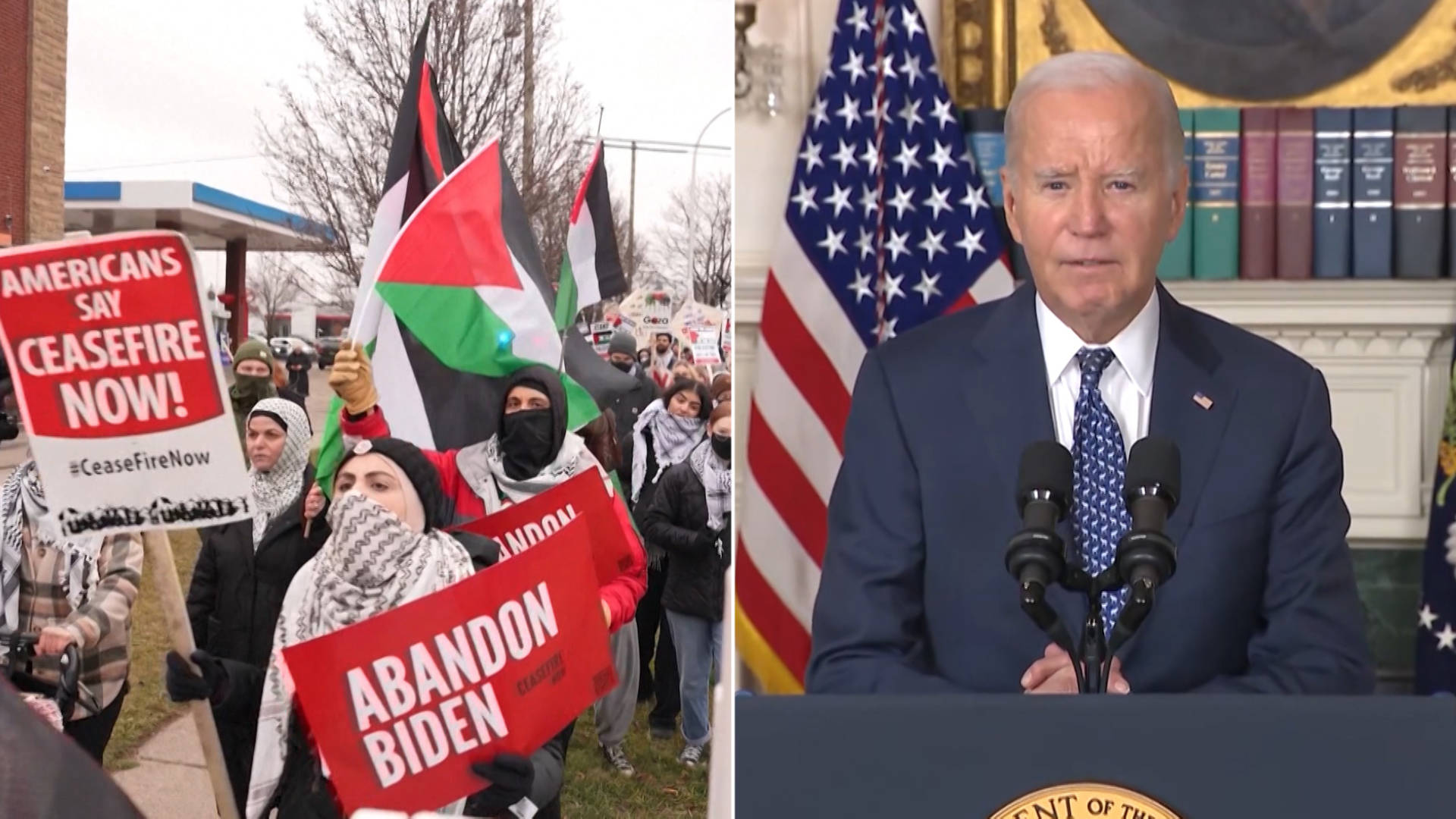This is a rush transcript. Copy may not be in its final form.
NERMEEN SHAIKH: Senior Biden administration officials traveled to Michigan on Thursday to meet with Arab American and Muslim leaders amid growing opposition to Biden’s candidacy over his support for Israel’s assault on Gaza. Michigan, which is an important swing state, is also home to the largest percentage of Arab Americans in the United States. Biden’s campaign manager traveled to Detroit last month, but a number of Arab American leaders and elected officials declined to meet with her over the war in Gaza. Last week, Biden traveled to Michigan himself to meet with members of the United Auto Workers union, who endorsed him, but he did not meet with any Arab American leaders.
White House Press Secretary Karine Jean-Pierre to a question about the meetings in Michigan at a news conference yesterday.
PRESS SECRETARY KARINE JEAN–PIERRE: Senior officials traveled to Michigan — and they are obviously traveling today — to hear directly from the community, to hear directly from community leaders on a range of issues that are important to them, obviously, as well, and not just them, but their families, including the conflict that we’re currently seeing in Israel and Gaza. This is a private meeting. We want to give them the space to have a meeting that certainly has candor, certainly where both — where we can hear directly from them. So, don’t want to get too far into what’s going to be discussed. But we want to hear directly from them. We want to hear their concerns. We believe it’s important for these leaders to be — to be able to speak directly to officials in the White House.
NERMEEN SHAIKH: Among the people who met with Biden administration officials yesterday was Michigan House Majority Floor Leader Abraham Aiyash. He’s the state’s highest-ranking Arab or Muslim leader. Representative Aiyash is among over 30 elected officials in Michigan who have signed on to a “Listen to Michigan” campaign and pledged to vote “uncommitted” in the state’s primary on February 27th. Representative Aiyash joins us now from Detroit.
Welcome to Democracy Now!, Representative Aiyash. If you could tell us who was present in this meeting, and what were your demands to them?
REP. ABRAHAM AIYASH: Thank you for having me.
There were several meetings throughout the day. We had folks from the National Security Council. Samantha Power was present, as well as other folks from the Biden administration and State Department. And the conversations were very frank. I know many of us did not spare any time or word in terms of discussing what we need.
And the conditions that we laid out are simple. We are expecting a permanent ceasefire. We want to see restrictions and conditions on the military aid that Israel continues to receive right now without any conditions and without any restrictions or parameters. And we want to see a serious commitment for the humanitarian aid to be sent to Gaza, as well as reinstating the funding for UNRWA.
So, we were clear that unless these demands are going to be initiated, then we have no interest in continuing the conversation with the White House, because now is not the time for posturing. I would be remiss to not mention that this meeting happened 19 days before the presidential primary here in Michigan.
AMY GOODMAN: Let’s talk about that, state Representative Aiyash. And you’re extremely significant as the number two person in the House in Michigan and, again, as Nermeen said, the highest-ranking Arab American and Muslim leader in Michigan. This meeting where — original meeting with the campaign manager for President Biden, you chose not to meet with her. He has sent out a whole group, including Samantha Power, former U.S. ambassador to the United Nations, now head of USAID, and Tom Perez, former labor secretary. This clearly has shaken the White House, the level of protest. When he was getting the endorsement of the UAW, UAW workers holding up signs calling for a ceasefire. Talk about why you decided to have this meeting and not boycott the invite, and also what they had to say to you about where President Biden stands on a ceasefire.
REP. ABRAHAM AIYASH: So, there was no direct commitment on the ceasefire. But what I will say is, when they invited us to meet with the campaign manager, we rejected it because this is not the time to engage in electoral politics, particularly when you see 30,000 innocent folks that have been murdered at the hands of weaponry that our U.S. taxpayer money has unfortunately funded. So the conversation was very clear that we need to have a serious framework for us to say the United States should lead with moral clarity and fight for peace and that we are not going to engage about this in any sense through electoral politics. Palestinian life should not be measured simply in poll numbers, but on the basis of their humanity. And that’s what we reiterated to them. And anytime there’s an opportunity to engage to help shift policy, we’re going to try to do that. And that was what yesterday’s attempt was.
And now the ball is in the president’s court and the White House’s court to see what they will do after hearing our concern. They could no longer say, “Well, we didn’t know.” We had very robust, very frank discussions with them, and they know where we stand. And now the question is: Are they going to heed the call of their constituents and do something that a majority of Americans and Democrats support in demanding for a ceasefire and an end to the violence?
AMY GOODMAN: Michigan is a key swing state, and the Arab American and Muslim community is key to the votes for President Biden. You’re part of a larger effort to vote “uncommitted” in the February primary in Michigan. Can you explain why you’ve made that decision, and if you addressed this yesterday with Biden administration officials?
REP. ABRAHAM AIYASH: So, we made it very clear with them that there would be no engagement on electoral politics at this moment, and we were not going to entertain that. But as far as February 29th — 27th, rather, for the Michigan presidential primary, we are going to remain uncommitted. And the reason why we’re doing that is because we need to let the White House know that they have an opportunity in this moment to earn the votes. As an elected official, I can tell you, when I run for office, I don’t say, “Well, the other guy is worse than me.” I give them a message and a platform for why I’m running. And we expect the White House and President Biden to do the same. And the expectation is, we are letting him know from now — it’s February; the election is November, but we are letting him know now — that we are uncommitted to his presidency until we see some changes in the policies that have affected both Americans here and so many abroad, as well as their families in the Gaza Strip.
NERMEEN SHAIKH: Well, I’d like to bring in Layla Elabed, a Palestinian American community organizer from Dearborn, Michigan, and a leader of the “Listen to Michigan” campaign, which is urging constituents to cast a vote for “uncommitted” on Michigan’s February 27th primary election in protest against President Biden’s ongoing support for Israel’s war on Gaza. Elabed is also the younger sister of Congressmember Rashida Tlaib, the only Palestinian American member of Congress.
Layla Elabed, welcome to Democracy Now! If you could begin by explaining why you decided to lead this campaign?
LAYLA ELABED: Well, personally, as a Palestinian American and somebody who, from the age of 12, saw the power of electoral politics within our Arab American and Muslim community, I knew that I wanted to be part of something that could possibly effect change. And the “uncommitted” campaign in Michigan is part of a larger anti movement, antiwar movement, across the country. And we’re focused on ending a war and stopping the military funding that supports genocide.
NERMEEN SHAIKH: Well, I’d like to turn to comments that President Biden made while speaking at the White House last night. After he addressed the special counsel’s report on his handling of classified information, Biden responded to a question on Israel’s assault on Gaza.
PRESIDENT JOE BIDEN: I’m of the view, as you know, that the conduct of the response in Gaza, in the Gaza Strip, has been over the top.
NERMEEN SHAIKH: Layla Elabed, if you could respond to what President Biden said, and what you hope will come out of this campaign?
LAYLA ELABED: That was — his comments were still not a call for a ceasefire or for the reevaluation of military aid to Israel, that is committing a genocide and an ethnic cleansing of Palestinians in Gaza. And until that happens, we cannot trust Biden, and we cannot commit our votes to him.
AMY GOODMAN: Let’s put the question to state Representative Abraham Aiyash. If you can respond to what the Biden administration is now saying? President Biden, Tony Blinken, just back from his Mideast trip, are not calling for a ceasefire, but Blinken is talking about a pause. But they are warning Netanyahu about a ground assault on Rafah. Can you talk about the significance of this? I mean, the area you come from in Michigan, and Layla coming from Dearborn, one of the largest Arab American communities in the United States, you represent, state Representative Aiyash, so many people who have family in Gaza right now. What that kind of ground assault would mean?
REP. ABRAHAM AIYASH: It would be devastating, one, for the people, but I think, more — more importantly, I think the broader conversation is we need to make sure that if this happens, that the American people are very aware of what is going to be the message in November. But we are going to keep having that conversation and letting them know. But at this point, it’s clear to them that we have made it our mission and our message that where we stand on this is very clear. We are a community that is demanding peace, and we expect it to be that way.
NERMEEN SHAIKH: Representative Abraham Aiyash, second-ranking Democrat in the Michigan House, thank you so much for joining us, and Layla Elabed, Palestinian American community organizer from Dearborn, Michigan.
When we come back, can Donald Trump be barred from running for president for engaging in an insurrection? That’s the case before the Supreme Court. We’ll speak with The Nation’s justice correspondent Elie Mystal.











Post comments (0)